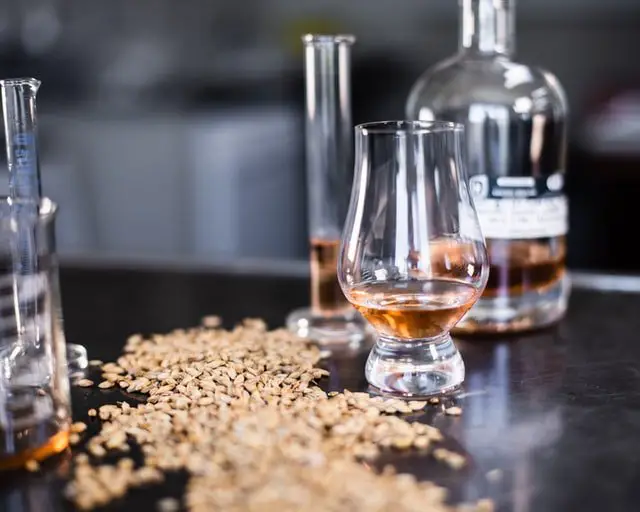How many glasses, or measures of whiskey do you get drunk with? or intoxicated? There is nothing that can replace the essence of alcoholic beverages at a party. Much less if we refer to whiskey, one of the most popular drinks around the world, which even has varieties made by different countries. Surely you have had the opportunity to, at least once, try it. The question is, how much do you need to get drunk?
Do you consider that you can resist a good amount of alcohol before you lose track? Let’s know what are the amounts that could intoxicate a person on average. If you drink alcohol frequently, you probably have some ideas. Join us to discover how much whiskey is needed to get us drunk.

First of all, why do we get drunk?
The answer can be as simple as saying we get drunk from drinking alcohol excessively. But no, our intention is to explain why our body reacts in such a way, giving rise to that series of behaviors so characteristic of an intoxicated person.
Drunkenness or drunkenness
Let’s start by understanding some basic points. It is called ethyl intoxication, or just, drunkenness, the physiological state that a person can acquire due to the consumption of alcohol excessively. During this state, the body will present changes in terms of its behavior, affecting each person differently.
The culprit of the state of drunkenness in our body is called ethanol. A substance can pass through the mucosa of the stomach and the membrane of our small intestine in a range of 30 to 80 minutes. Although it may not seem like it, this time range is really fast, which is precisely due to the low molecular weight of ethanol.
When this substance enters our body, it reaches the brain through the bloodstream, and this is where disaster begins. The binding of two receptors called N-methyl-D-asparate (NMDA) and y-aminobutyric acid (GABA) begins by compromising the typical functioning of our brain.
In more technical terms, neural transmission will slow down, which will lead to calm behavior in our person. Subsequently, our memory will be compromised in conjunction with our physical capacity, giving a feeling of tiredness and, of course, with a problem processing information. The more alcohol, the more this situation will become more potentiated.
But not only that: How many glasses, or measures of whiskey do you get drunk with?
Another process that occurs during alcohol consumption is the release of different substances such as cortisol, adrenaline and norepinephrine, which significantly increase the heartbeat of our heart. As a consequence, the airways open, increasing the flow of oxygen to the brain, and, therefore, our sensitivity to the senses.
There is a feeling closely associated with alcohol, in which we are totally happy and friendly to our environment. This occurs due to the release of dopamine, a neurotransmitter responsible for the feeling of happiness.
How many grams of whiskey can intoxicate us?
Already with some context, we can answer our main question. The fact is that a person can get drunk with an amount of 1.5 – 2.0 grams of alcohol per liter of blood in his body. An amount with which you can find yourself in a state of significant drunkenness, with a compromised and evidently affected physical performance.
Clearly, there are variants that could result in more alcohol-resistant bodies, specifically, the amount of alcohol required to get drunk. For example, it is known that Asians have lower levels of mitochondrial dehydrogenase, a substance that participates in the conversion of ethanol in our body. This makes them more likely to get drunk.
How does our body behave when we get drunk?
When alcohol enters the body, an enzyme called alcohol dehydrogenase will act by converting the ethanol into acetaldehyde, eventually converting it into acetic acid. All these processes generate molecules called NAHD, originated in the so-called reducing power. Let’s see in greater detail what happens to each substance in our body:
- Aldehyde dehydrogenase inhibitors: Typically, they are the additives of beverages. When we consume alcohol in excess, these substances end up inhibiting the enzyme aldehyde dehydrogenase. Consequently, the body looks for a way to eliminate them through chemical processes, which will usually end in vomiting.
- Unreacted ethanol: In these cases, the transmission of membranes in our body is compromised. As a result, we will have greater difficulty reasoning and responding adequately to the environment.
- Reducing power: It is a process that converts testosterone into estrogen. When we drink alcohol in excess, this process is enhanced, which will naturally increase sexual appetite. However, the performance will not be the best, because the lack of testosterone will affect physical performance.
- Etanal: Decreases the volume of neurotransmitters, since it will form salsolinol when reacting with endogenous dopamine. Because of this, coordinated movements will be more difficult, thus affecting our motor skills.
Since ethanol attaches to the areas where the brain receives energy supplies, our complex processes such as thinking and decision-making will be affected as we consume more alcohol.
A very own limit
As we can see, the consumption of alcohol can lead to changes in our body, which end up seriously affecting our performance both physically and mentally. In any of these cases, it will also depend on the resistance that the user has to alcohol itself.
Other factors can also affect this process, such as the intake of food that the user has had hours before; the rhythm with which you drink the drink and the substances with which you would be mixing your whiskey. This is why we should not value the limit point only by the amount of alcohol that is being taken only.
In any of the cases, the state of drunkenness is not a positive situation for the body, since its habit can lead to diseases such as liver cirrhosis, alcoholism, cancer, among others. It does not mean that we should avoid alcohol at all costs, but rather learn to drink it in the right and necessary amounts on each occasion.
Sources
1- Gonzales, A. (2019) Why do we get drunk?. Vinetur. Retrieved from: https://www.vinetur.com/2019123158936/por-que-nos-emborrachamos.html
2- Arteaga, S. (2016) What happens to our brain when we drink alcohol?. Computerhoy. Retrieved: https://computerhoy.com/noticias/life/que-pasa-nuestro-cerebro-cuando-bebemos-alcohol-56252
Read also: Types of Whisky, classes; Does whiskey have an expiration date? Caduceus?; Which whiskey is better Buchanans or Johnnie Walker?; Benefits of Whiskey; How much sugar and calories does whiskey have?
- Die 20 besten Kliniken und Krankenhäuser in Berlin - April 30, 2025
- Top 20 Kliniken und Krankenhäuser in Hamburg - April 30, 2025
- Asklepios Klinik St. Georg: Ihr Partner für hochqualitative Medizin und ganzheitliche Gesundheitsversorgung (1) - April 30, 2025
